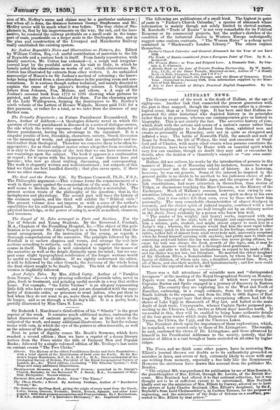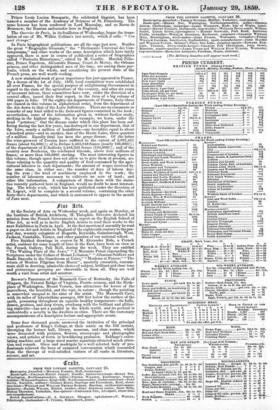LITERARY NEWS.
The literary event of the week is the death of Hallam, at the age of eighty-one. Another link that connected the present generation with tho past is thus snapped, though the connection was rather in a chrono- logical sense, than as a literary type. It has been said that Hallam re- presented the older historians who depicted history in its principles rather than in its persons, whereas our contemporaries give us history in biography. This is not strictly the fact. The narrative history of yore, which dealt with the actions and actors of a nation's career rather than the political philosophy to be deduced from them, exhibited men and events as personally as Macaulay, only not in quite so elongated and inflated a way. The battle of Bosworth Field, the assault and sack of Rome by Bourbon, the life of Wolsey, the trial and execution of Straf- ford and of Charles, with many other events when persons constitute the chief features, have been told by Hume with an essential spirit which very few can emulate, though no doubt they may add or encumber by details, after the fashion of a Quarterly's essayist or "our own corre- spondent." Hallam did not enliven his works by the introduction of persons in the manner of Hume, or of Macaulay and his imitators, because he was of the expositional not the narrative school of history. As a historian, however, he was sui generis. Some of the interest he inspired in the general public is no doubt to be ascribed to his judicious choice of sub- jects. The condition of the Middle Ages, and the progress of the Eng- lish &institutions, had more attraction in themselves, than stories of Tithed, or discussions touching the Mare Clausum, or the History of the Exchequer. Much of Hallam's success, however, was owing to con- scientious labour, and to a genial warmth and spirit so deep in his own nature, that it was rather felt than seen, even by those who knew him personally. The very remarkable characteristics of almost drudgery in research, and the closest spirit of judicial inquiry, combined with a sort of boyish buoyancy of genius, are well brought out by an obituary notice in the Daily News evidently by a person who knew him well.
" The reader of his weighty (not heavy) works, impressed with the judicial character of the style, both of thought and expression, imagined him a solemn, pale, student, and might almost expect to seem him in a Judge's wig ; whereas, the the stranger would find him the most rapid talker in company, quick in lin movements, genial in his feelings, earnest in nett- rative, rather full of dissent from what everybody said, innocently surprised when he found himself agreeing with anybody, and pretty sure to blurt out something awkward before the day was done—but never giving offence, be- cause his talk was always the fresh growth of the topic, and, it may be added., his manners were those of a thorough-bred gentleman He was rich, and able to follow his inclinations in regard to his mode of life ; and his choice was not law, but literature. He married the eldest daughter of Sir Abraham Elton, a 'Somersetahire baronet, by whom he had a large family of children of whom only one, a daughter, survived him. Most, or
'
all of them and also their mother, died instantaneously; and few men could have borne the repeated shock as he did."
There was a full attendance of scientific men and "distinguished foreigners" at the meeting of the Royal Geographical Society on Monday. Papers were read, the most important of which were reports from Captains Burton and Speke engaged in a journey of discovery in Eastern Africa. The country they are exploring lies to the West and North of Zanzibar, embracing, in a rough estimate, from the tenth degree of South latitude to the equator, and from the 28th to 38th degree of East longitude. The report says that these enterprising officers had left the shores of Lake Ugiji in theanonth of May last, and halted at the main dep8t of Arab trade, lJnyanyembe, whence Captain Spoke purposed pro- ceeding to the Ukerewa Lake, twelve or fifteen days' marches north. If successful in this, they will be enabled to bring home authentic details of the four great waters which drain Eastern Central Africa, namely, the Nyassa, the Chiwa, the Ugiji and the Ukerewa Lakes.
The President dwelt upon ;he importance of these explorations, which, he remarked, were second only to those of Dr. Livingstone. The results, he said, confirmed the views of Dr. Livingstone, and those advanced by himself in his Presidential Addresses to the society, namely, that the interior of Africa is a vast trough or basin encircled on all sides by higher ridges.
The Times, and we think some other papers, have in reviewing Mee. Elliott's journal thrown out doubts as to its authenticity grounded on mistakes in dates, and errors of fact, extremely likely to occur with any one writing from memory, especially a fine lady like the Reminiscent. However the strictures have drawn this account from the publisher Mr. Bentley. "The original MS. was purchased for publication by me of Miss Bentinck, the granddaughter of Mrs. Elliott, through Mr. Levien, of the Bridal Mu- seum. Miss Bentinck had offered it to that national collection, but it was thought not to be of sufficient extent to be entertained. Miss Bentinck kiMly sent me the miniature of Mrs. Elliott by Camay, allowed me to halt the picture of Lady Charles Bentinck (Mrs. Elliott's daughter), by Sir I. Reynold's from Lord Cholmondeley's, in Carlton Terrace, for the purpose of engraving, and the miniature of the Duke of Orleans on a snuffbox, pre- sented to Mrs. Elliott by that prince." Prince Louis Lucien Bonaparte, the celebrated linguist, has been named a member of the Academy of Sciences of St. Petersburg. The same honour has been conferred on Lord Macaulay, and on Baron de Brtmnow, the Russian ambassador here in England.
The Courrier de Paris in its feuflleton of Wednesday, began the trans- ]ation of one of Mr. Wilkie Collins's last novels, which it calls : "Use suit &range."
In Paris biographical publications are all the rage just now. Besides the great " Biographie Generale' " the "Dictionaire Universel des Con- temporains," and other works of the same description which have lately appeared, there is now in course of publication a series of biographies called "Portraits Historiques,", edited by M. Castille. Marshal Pella- Eder, Prince Napoleon, Alexandre Dumas, Count de Moray, the Orleans princes, and other distinguished men of the time, are among these por- traits, which on the whole and considering the present state of the French press, are well wort]; reading.
A new statistical work of great importance has just appeared in France. By a decree of the 1st of July, 1862, local committees were established all over France for the special purpose of enlightening Government in regard to the state of the agriculture of the country, and after six years of incessant labour, these committees have now, under the direction of a central office, issued their first report, in the form of a big volume of 600 pages in folio. Of the eighty-six departments of France, forty-three are classed in this volume in alphabetical order, from the department of the Aix down to that of the Loire Inferieure. There are no comments or remarks of any kind added to the facts and figures contained in the book ; nevertheless, some of the information given is, without further study, striking in the highest degree. So, for example, we learn under the head "potatoes," that the disease under which this plant has been suf- fering during the last few years, has destroyed in one department, that of the Isere nearly a million of hectolitres-one hectolitre equal to about a hundred pints-and in another, that of the Haute Loire, three quarters of a million. Equally fatal has been the grape disease. Of the latter the wine-growers of Corsica have suffered to the extent of 2,097,411 francs (about 84,0001) • of la Drame 2,403,940 francs (nearly 100,0000 ; of the department of L'Ardeche 3,348,320 francs (134,0000 ; and of the country near Bordeaux, the celebrated Gironde, above four millions of francs, or more than 160,0001. sterling. The most interesting figures in this volume though space does not allow us to give them at present, are those relating to the quantity and quality of food consumed by the agri- cultural labourer in each department; the amount of wages received by the same class, in either sex; the number of days of labour dur- ing the year ; the kind of machinery employed in the 'work; the number of labourers necessary to cultivate an acre of land ; and other like information. A comparison of these facts with the statis- lies recently gathered here in England, would no doubt be most interest- ing. The whole work, which has been published under the direction of M. Legoyt, will be complete in a second volume, containing the other forty-three departments, and which is announced to appear in the month of June next.



























 Previous page
Previous page